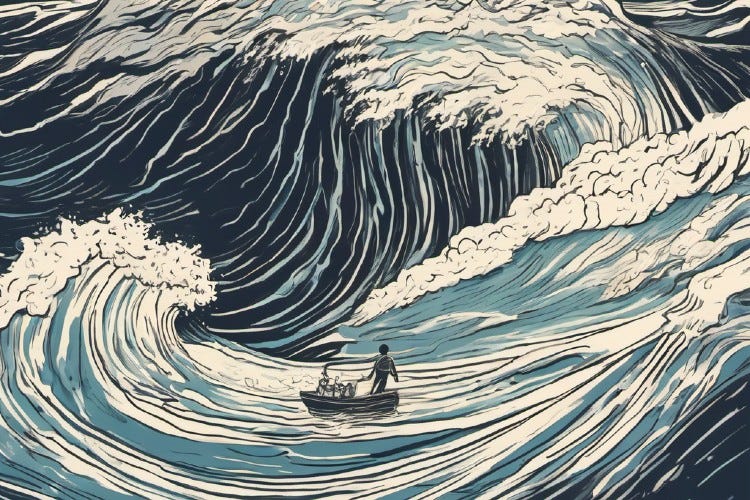What I've Learned in Three Years of I Might Be Wrong
Lesson one: People are horny for Whig Party content!
I Might Be Wrong was borne of the Great Media Freakout of the early 2020s. In that era, many esteemed publications decided it would be a good idea to stuff their credibility with dynamite and blow it to bits. Outlets that arguably invented modern journalism suddenly sounded like college freshmen who had read half a Chomsky essay and would like to tell you how the world works. Readers, watchers, and listeners fled in droves. It was an asteroid strike that massively altered the media ecosystem.
At that moment, for the first time in my adult life, I was not a writer. In February of 2020, I had left Last Week Tonight with John Oliver for greener pastures. But I got lost on my way to those greener pastures, and by late 2020, I was not “grazing on the lush grass of greener pastures” so much as “trapped in a port-a-potty going over Niagara falls”. Covid had decimated the TV industry, and the Racial Reckoning certainly hadn’t made me more employable. I was, at that moment, a five-time Emmy winning construction worker: To get income from somewhere, anywhere, I was renovating The Shittiest Condo In Brooklyn. I spent eight months adding value by installing high-end features like floors that don’t have huge fucking holes in them and toilets. There was some peace to be had in that work, and sometimes I liked it, but I kept thinking: “So…am I just not a writer anymore?”
I finished the condo that spring and I launched I Might Be Wrong in June. This blog — the thing I started doing mostly because it just felt weird not to write — is now three years old. I’ve learned a lot, especially since I made this a full-time gig in November. Becoming an accidental media figure and deeply incompetent small business owner has made me think about the relationship between the news business and news content. And I, the content producer, have learned some things that I think you, the content consumer, might want to know.
The first thing I want to say is: Fox News, I get it now. I used to wonder how Fox could churn out braindead propaganda in which they reinforce their audience’s worldview by flogging the same tired narratives night after night. And now I understand: There’s money in that. Fox News is successful because the people there are reaping the benefits of having bludgeoned their moral compass to death and thrown its corpse down a well. One of Jim Lehrer’s 16 rules for journalism with integrity was: “You are not in the entertainment business”. And, indeed, he was not. You know what else he wasn’t? Rich — that guy gave off big-time “drives a Toyota Camry” vibes. Fox News has fully embraced the news-as-entertainment model: They give the people what they want, even if what they want is idiotic, and I’m sure the big shots at Fox could have bought and sold Jim Lehrer’s public television ass 100 times over.
Writers become attuned to what our audience wants, and audience capture is a constant danger. Any writer with half a brain — and I like to think that describes me — will figure out what works and be tempted to simply play the hits. When I pen an article with a boner-killing headline like Why is Housing a Municipal Issue?, I feel like I should turn to my son and say: “Looks like it’s state school for you, kid.” What a writer in the news space chooses to write about matters; it’s possible to create a badly distorted picture of the world just by omitting inconvenient narratives. And once you cultivate an audience that believes Thing X, it’s very tempting to just tell stories that reinforce Thing X, and stories that contradict Thing X start to feel like throwing money out the window.
It’s also true that splashy stuff gets attention. Conflict sells, which is why most reality TV shows simply take a bunch of unstable people, lock them in a house, and then poke them with sticks until they claw each others’ eyes out. American politics is also divided into teams, so if you’re willing to wade into the arena and perform Twitter combat on your team’s behalf, fame could ensue. A writer in the news space has every incentive to be partisan, confrontational, and just to generally act like a silverback gorilla with a pinecone stuck up its ass.
I’m making the media landscape sound pretty bleak. But it’s not all bleak — if it was, I’d go back to remodeling houses. And one of the main lessons I’ve learned in three years is a welcome surprise that’s made me excited about the future of I Might Be Wrong.
I’ve mentioned the “media ecosystem”, so for a moment, imagine it as a literal ecosystem. The various publications are the animals in the ecosystem, and the readers/clicks/dollars are the natural resources over which the animals compete. Everything I’ve described — shameless pandering, blind partisanship, and performative combat — comprises daily life on the abundant savannah. But here’s the thing: You don’t have to live on the savannah. You can go high into the mountains, where resources are scarce. And on the one hand: Resources are scarce, it can seem like an unwelcoming place to be. But the good news — actually, the great news — is that there are also fewer competitors. The animals-to-resources ratio is still roughly in balance, which makes it possible to stay in the mountains and and skip all the bullshit down on the savannah.
In three years, I think I’ve found a way to make a living in my little corner of the media ecosystem. I’ve written about zoning and the Whig Party and the Pazzi conspiracy and lived to tell the tale. I Might Be Wrong is growing at a steady pace, and I’m not expecting any hired goons to come break my thumbs. Don’t get me wrong: Even with steady growth, I’ll be part of the Toyota Camry set for the foreseeable future. But I’m free to touch third rails and write about the Russo-Japanese War and my kid isn’t giving off “Harvard material” vibes anyway, so no harm done.
Thank you to everyone who’s made it possible for me to refer to this as a “job” without feeling like I’m totally full of shit. My first post went out to 27 free subscribers, one of whom was my wife, and one of whom was my mom. Now, I’m close to 14,000 unpaid subscribers and 1,000 paid. That’s not a huge audience compared to some new media folks — there are seven year-old YouTube “unboxing” celebrities who would laugh their asses off at my 14,000 subscribers — but I’ve done it my way. My growth has come almost entirely from shares, re-stacks, and recommendations, and I’m proud of that. There’s just enough sustenance on my side of the mountain that I don’t have to whore it up down on the savannah. I’ve spent three years learning how this media deal works, and the main thing I’ve learned is that it’s workable.








Two things:
The Camry is an extremely well made vehicle; it spends way less time in the shop than do expensive sports cars. Also, it doesn’t scream “I’m having a midlife crisis and am very worried about my masculinity.”
A good state university will be much better for your son than an Ivy League one. The level of instruction is the same, and the student body really is diverse (“from all walks of life,” as the pre-DEI saying goes).
And a third one:
Keep up the good work!
This Substack has some of the funniest stuff I've ever read. It's also fair and insightful.